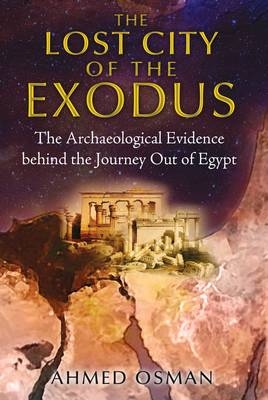
The Lost City of the Exodus
The Archaeological Evidence behind the Journey Out of Egypt
Seiten
2014
Bear & Company (Verlag)
978-1-59143-189-3 (ISBN)
Bear & Company (Verlag)
978-1-59143-189-3 (ISBN)
Recent archaeological findings confirm Osman's 25-year-old discovery of the location of the city of the Exodus.
When the first archaeologists visited Egypt in the late 1800s, they arrived in the eastern Nile Delta to verify the events described in the biblical Book of Exodus. Several locations believed to be the city of the Exodus were found but all were later rejected for lack of evidence. This led many scholars to dismiss the Exodus narrative merely as a myth that borrowed from accounts of the Hyksos expulsion from Egypt. But as Ahmed Osman shows, the events of Exodus have a historical basis and the ruins of the ancient city of Zarw, where the Road to Canaan began, have been found.
Drawing on decades of research as well as recent archaeological findings in Egypt, Ahmed Osman reveals the exact location of the lost city of the Exodus as well as his 25-year effort to have this finding confirmed by the Egyptian government, including his heated debates with Zahi Hawass, former Egyptian Minister for Antiquities Affairs. He explains why modern scholars have been unable to find the city of the Exodus: they are looking in the wrong historical period and thus the wrong region of Egypt. He details his extensive research on the Pentateuch of the Hebrew scriptures, the historical scenes recorded in the great hall of Karnak, and other ancient source texts, which allowed him to pinpoint the Exodus site after he discovered that the Exodus happened not during the pharaonic reign of Ramses II but during that of his grandfather Ramses I.
Osman concluded that the biblical city of the Exodus was to be found at Tell Heboua at the ruins of the fortified city of Zarw, the royal city of Ramses I--far from the Exodus locations theorized by previous archaeologists and scholars. In 2012, after 20 years of archaeological work, the location of Zarw was confirmed by Egyptian officials exactly where Osman said it would be 25 years ago. Thus, Osman shows that, time and again, if we take the creators of the source texts at their word, they will prove to be right.
When the first archaeologists visited Egypt in the late 1800s, they arrived in the eastern Nile Delta to verify the events described in the biblical Book of Exodus. Several locations believed to be the city of the Exodus were found but all were later rejected for lack of evidence. This led many scholars to dismiss the Exodus narrative merely as a myth that borrowed from accounts of the Hyksos expulsion from Egypt. But as Ahmed Osman shows, the events of Exodus have a historical basis and the ruins of the ancient city of Zarw, where the Road to Canaan began, have been found.
Drawing on decades of research as well as recent archaeological findings in Egypt, Ahmed Osman reveals the exact location of the lost city of the Exodus as well as his 25-year effort to have this finding confirmed by the Egyptian government, including his heated debates with Zahi Hawass, former Egyptian Minister for Antiquities Affairs. He explains why modern scholars have been unable to find the city of the Exodus: they are looking in the wrong historical period and thus the wrong region of Egypt. He details his extensive research on the Pentateuch of the Hebrew scriptures, the historical scenes recorded in the great hall of Karnak, and other ancient source texts, which allowed him to pinpoint the Exodus site after he discovered that the Exodus happened not during the pharaonic reign of Ramses II but during that of his grandfather Ramses I.
Osman concluded that the biblical city of the Exodus was to be found at Tell Heboua at the ruins of the fortified city of Zarw, the royal city of Ramses I--far from the Exodus locations theorized by previous archaeologists and scholars. In 2012, after 20 years of archaeological work, the location of Zarw was confirmed by Egyptian officials exactly where Osman said it would be 25 years ago. Thus, Osman shows that, time and again, if we take the creators of the source texts at their word, they will prove to be right.
Ahmed Osman was born in Cairo in 1934 and is the author of several books, including Christianity: An Ancient Egyptian Religion and Moses and Akhenaten. He lives in England.
Prologue
Introduction: The Brotherhood, Communism, and Moses
1 The Story of the Exodus
2 Who Wrote the Exodus Story?
3 Egypt Remembers
4 Hyksos or Israelites
5 Freud’s Dream
6 Hebrews, Israelites, and Jews
7 Velikovsky’s Myth
8 The Miracle of Santorini
9 Joseph’s Mummy in the Cairo Museum
10 Moses and Akhenaten
11 The Semitic Pharaoh of the Exodus
12 Which Ramses Are We Looking For?
13 Closing In on the Lost City of Ramses
14 Debate at the Egyptian Embassy
15 Exodus Fiction
16 Uncovering the Lost City of Ramses
Notes
Bibliography
Index
| Erscheint lt. Verlag | 8.5.2014 |
|---|---|
| Zusatzinfo | 15 b&w illustrations |
| Verlagsort | Rochester |
| Sprache | englisch |
| Maße | 152 x 229 mm |
| Gewicht | 277 g |
| Themenwelt | Sachbuch/Ratgeber ► Gesundheit / Leben / Psychologie |
| Geisteswissenschaften ► Archäologie | |
| Geschichte ► Allgemeine Geschichte ► Vor- und Frühgeschichte | |
| Geisteswissenschaften ► Religion / Theologie ► Weitere Religionen | |
| Sozialwissenschaften ► Soziologie | |
| ISBN-10 | 1-59143-189-1 / 1591431891 |
| ISBN-13 | 978-1-59143-189-3 / 9781591431893 |
| Zustand | Neuware |
| Informationen gemäß Produktsicherheitsverordnung (GPSR) | |
| Haben Sie eine Frage zum Produkt? |
Mehr entdecken
aus dem Bereich
aus dem Bereich
Was Pompeji über uns erzählt
Buch | Hardcover (2023)
Propyläen (Verlag)
CHF 44,75
auf den Spuren der frühen Zivilisationen
Buch | Hardcover (2023)
C.H.Beck (Verlag)
CHF 27,95


